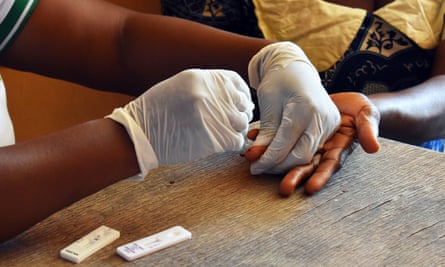Researchers have found “troubling” evidence for the first time that a lifesaving malaria drug is becoming less effective in young African children with serious infections.
A study of children being treated in hospital for malaria in Uganda, presented at a major conference on Thursday, found signs of resistance to artemisinin in one patient in 10.
Antimicrobial resistance, where pathogens such as parasites, bacteria and fungi develop ways to evade the drugs used to fight them, is a growing global concern. It is forecast to kill more than 39 million people by 2050.
Children are the most vulnerable to malaria, with about 450,000 under-5s dying from the disease in sub-Saharan Africa each year. Of the 100 children studied, 11 showed partial resistance to the treatment. All were infected by malaria parasites carrying genetic mutations that have been linked to artemisinin resistance.
Dr Chandy John, of Indiana University, who co-wrote the study with international colleagues, said: “This is the first study from Africa showing that children with malaria and clear signs of severe disease are experiencing at least partial resistance to artemisinin.”
A further 10 of the children studied, who were thought to have been cured of infection, suffered a repeat attack from the same strain of malaria within a month. The results suggest that the “gold-standard” treatment they had received, combining artemisinin with a second malaria drug called lumefantrine, was not working as well as it should.
John said the study was started after researchers noticed a slow response to treatment in some children who were already being monitored for a project on severe malaria in young patients.

“The fact that we started seeing evidence of drug resistance before we even started specifically looking for it is a troubling sign,” John said.
“We were further surprised that, after we turned our focus to resistance, we also ended up finding patients who had recurrence after we thought they had been cured.”
The study is being presented at the annual meeting of the American Society of Tropical Medicine & Hygiene in New Orleans, and published in the Journal of the American Medical Association.
John said it was too early to determine how widespread resistance to artemisinin was in Africa, although there was evidence it was spreading, pointing to studies showing partial resistance in children with uncomplicated malaria – a milder form that does not affect organs – in countries such as Rwanda and Uganda.
However, he said: “I think our study is the ‘canary in the coalmine’ for children with severe malaria.”
Resistance to artemisinin therapies emerged earlier in south-east Asia, where the first signs were identified in similar studies. Treatment failure rates in that region increased when resistance also emerged to drugs used in combination with artemisinin. Dr Richard Pearson, of the Wellcome Sanger Institute, who was not involved in this study, said the situation in east Africa was reminiscent of the situation in south-east Asia 15 years ago.
Artemisinin is used in a variety of forms to treat the disease. For children with severe malaria, this consists of an intravenous infusion of artesunate, one derivative of artemisinin, followed by an oral drug combining a second derivative with another antimalarial medicine.
Artesunate replaced quinine as the recommended treatment for children with severe malaria more than a decade ago, after a trial showed fewer deaths with the newer drug. “Returning to quinine would be a step backward,” John said.
Dr Alena Pance, a senior lecturer in genetics at the University of Hertfordshire, said any indication of resistance to the “critical drug” was extremely worrying and that high transmission rates in Africa “imposes a dangerous risk of quick spreading of resistance within the continent, making these findings even more alarming”.

.png) 2 months ago
15
2 months ago
15













































